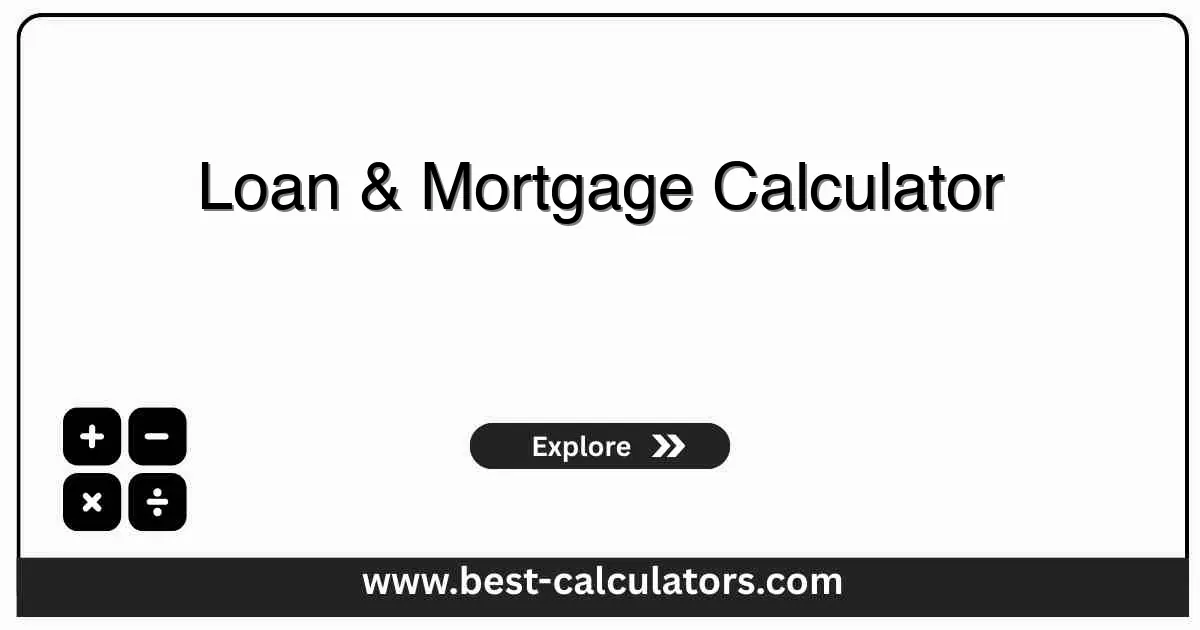Loan & Mortgage Calculator - Calculate Monthly Payments
Free loan and mortgage calculator to determine monthly payments including principal, interest, taxes, and insurance. Compare different loan options and terms.
Loan Calculator
Results
Common Examples
How to Use This Calculator
Select Loan Type
Choose the type of loan you want to calculate (mortgage, personal, auto, etc.)
Enter Loan Details
Input the loan amount, interest rate, and loan term in years
Add Additional Costs
For mortgages, enter down payment, property tax, and home insurance
Calculate Results
Click calculate to see your monthly payment and detailed breakdown
Understanding Loans
A loan is a financial agreement where a lender provides money to a borrower with the expectation that the borrower will repay the amount borrowed, plus interest, over a specified period.
Types of Loans
There are many types of loans including mortgages (home loans), auto loans, personal loans, student loans, and business loans. Each serves a specific purpose and has different terms, interest rates, and requirements.
Loan Components
Loans consist of principal (the amount borrowed), interest (cost of borrowing), and sometimes additional costs like fees, taxes, and insurance. Understanding these components helps you make informed borrowing decisions.
If you're considering saving for your future, our Savings Calculator can help you project how your deposits will grow over time.
If you're interested in investing, check out our Investment Calculator to see potential returns on your investments.
For understanding compound interest, our Compound Interest Calculator demonstrates how your money can grow exponentially.
Understanding Your Results
Your loan calculation provides valuable insights into your borrowing costs and monthly obligations.
Monthly Payment
This is your total monthly obligation, including principal, interest, taxes, and insurance. It's the amount you'll need to budget for each month.
Principal & Interest
Principal is the portion that reduces your loan balance, while interest is the lender's fee for lending money. Early payments are mostly interest, while later payments are mostly principal.
Total Interest
This represents the total cost of borrowing over the loan term. Reducing the interest rate or loan term can significantly decrease this cost.
Important Considerations and Limitations
While our loan calculator provides accurate results, it's important to understand its limitations and consider additional factors.
1. Additional Costs
Our calculator doesn't include origination fees, closing costs, or other lender fees that may apply. These can add thousands to your loan cost.
2. Variable Rates
If you have an adjustable-rate loan, your payments may change over time based on market conditions. Our calculator assumes a fixed rate.
3. Prepayment Options
Making extra payments can reduce your total interest costs. Our calculator shows scheduled payments only and doesn't account for early repayment.

Frequently Asked Questions (FAQ)
Q: What is included in a loan payment?
A: A complete loan payment typically includes principal (amount borrowed) and interest (cost of borrowing). For mortgages, it may also include taxes and insurance (PITI). Principal reduces your loan balance, interest is the cost of borrowing, taxes are paid to local governments, and insurance protects against property damage.
Q: How much can I borrow?
A: Lenders typically consider your debt-to-income ratio, credit score, employment history, and down payment amount. Most lenders prefer your total housing payment to be no more than 28% of your gross monthly income and total debt payments no more than 36% of your income.
Q: Should I choose a fixed or adjustable rate loan?
A: Fixed-rate loans offer predictable payments and protection against rising rates but may have higher initial rates. Adjustable-rate loans (ARMs) start with lower rates but can change over time. Choose fixed-rate for stability and ARMs if you plan to move before rates adjust or expect rates to fall.
Q: What's the difference between interest rate and APR?
A: Interest rate is the cost of borrowing the principal loan amount. APR (Annual Percentage Rate) includes the interest rate plus other costs like broker fees, discount points, and some closing costs, expressed as an annual rate. APR provides a more accurate picture of the loan's total cost.
Q: How can I reduce my loan costs?
A: Improve your credit score, shop around for the best rates, consider a shorter loan term, make a larger down payment, and pay discount points to lower your interest rate. Making extra payments toward principal can also reduce total interest costs.
Q: What is PMI and when is it required?
A: PMI (Private Mortgage Insurance) protects lenders if you default on your loan. It's typically required when your down payment is less than 20% of the home's value. Once your equity reaches 20%, you can usually request PMI removal.